Kew Surname Ancestry ResultsOur indexes 1845-1865 include entries for the spelling 'kew'. In the period you have requested, we have the following 16 records (displaying 1 to 10): Buy all | | | Get all 16 records to view, to save and print for £96.00 |
These sample scans are from the original record. You will get scans of the full pages or articles where the surname you searched for has been found. Your web browser may prevent the sample windows from opening; in this case please change your browser settings to allow pop-up windows from this site. Gentlemen amateur rowers
(1835-1851)
Rowing was one of the English sports covered in detail in the pages of Bell's Life in London, and from these was compiled a compendium called the Aquatic Oracle. The text is divided into two main parts: Gentlemen Amateurs and Watermen. All the entries are cross-referenced, and use these abbreviations: w., won; l., lost; b., beat; bn., beaten; sc. ma., scullers' match; o. ma., oars match; do. sc. ma., double scullers' match; 4 o.ma., 4 oars match; 8 o. ma., 8 oars match; sk., stroke; cox., coxswain; as., a side; Oxon., Oxonian; V. to P., Vauxhall to Putney; W. to P., Westminster to Putney; P. to M., Putney to Mortlake; M. to P., Mortlake to Putney; dis., distance.KEW. Cost: £6.00.  | Sample scan, click to enlarge
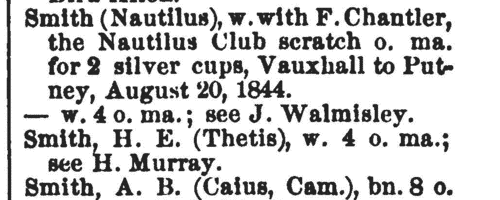
| Pupil Teachers in Lancashire: Boys
(1851)
The Committee of Council on Education awarded annual grants for the training and support of pupil teachers and stipendiary monitors in schools in England, Wales, Scotland, the Isle of Man and the Channel Islands. Pupil teachers started training between the ages of 13 and 15, and 'must not be subject to any bodily infirmity likely to impair their usefulness as Pupil Teachers, such as scrofula, fits, asthma, deafness, great imperfections in the sight or voice, the loss of an eye from constitutional disease, or the loss of an arm or leg, or the permanent disability of either arm or leg, curvature of the spine, or a hereditary tendency to insanity'.
They also had to obtain certificates from the managers of the school (and their clergyman, in the case of Church of England schools) as to their moral character and that of their family; good conduct; punctuality, diligence, obedience, and attention to duty; and attentiveness to their religious duties.
This detailed statement in the annual report of the committee for the year ending 31 October 1851 lists schools by county, giving:
1. Name and Denomination of School, with these abbreviations - B, British and Foreign School Society; F. C., Free Church of Scotland; H. C., Home and Colonial School Society; N., National Society, or connected with the Church of England; R. C., Roman Catholic Poor-School Committee; Wesn., Wesleyan Methodist.
2. Annual grants conditionally awarded by the committee in augmentation of teachers' salaries, and in stipends to apprentices, and gratuities to teachers.
3. Month in which annual examination was to be held.
4. Names of apprentices, giving surname and initials, and year of apprenticeship. Stipendiary monitors are indicated by (S. M.).KEW. Cost: £6.00.  | Sample scan, click to enlarge
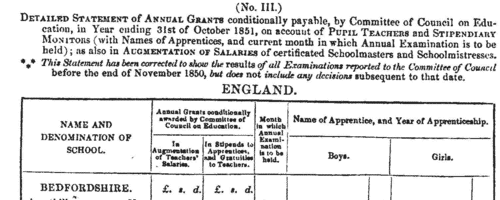
| Traders and professionals in London
(1851)
The Post Office London Directory for 1851 includes this 'Commercial and Professional Directory', recording about 80,000 individuals. KEW. Cost: £4.00.  | Sample scan, click to enlarge

| North Lincolnshire Non-Voters: Gainsborough Polling District
(1852)
The Poll Book for North Lincolnshire (Lindsey) in the General Election of 1852 was prepared from the poll clerks' lists, and so is arranged polling district by polling district, and within those by township or parish, but with non-voters listed separately at the end of each polling district. The 9,620 voters are listed not by residence, but by the parish or township in which lay the property that gave the right to vote: consequently 260 electors appear twice on the register. 1,797 did not vote. Many of the electors lived outside the area, or even outside the county. The names are listed roughly alphabetically by surname, with christian name, residence and occupation: with a key to the nature of their property (freehold fr, rented rt, or copyhold ch), and for whom the votes were cast (CR.: Rt. Hon. R. A. Christopher, who received 5,585 votes; CH.: Sir Montague J. Cholmeley, 4,777; S.: James Banks Stanhope, 5,575). Each elector had two votes. The franchise comprised all adult males in possession of 40s freehold, or £10 copyhold or leasehold, annual value. At the end of each polling district is a list of electors who did not vote, many living at a distance from the area.KEW. Cost: £6.00.  | Sample scan, click to enlarge
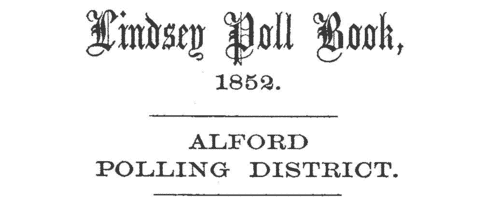
| North Lincolnshire Voters: Tattershall
(1852)
The Poll Book for North Lincolnshire (Lindsey) in the General Election of 1852 was prepared from the poll clerks' lists, and so is arranged polling district by polling district, and within those by township or parish, but with non-voters listed separately at the end of each polling district. The 9,620 voters are listed not by residence, but by the parish or township in which lay the property that gave the right to vote: consequently 260 electors appear twice on the register. 1,797 did not vote. Many of the electors lived outside the area, or even outside the county. The names are listed roughly alphabetically by surname, with christian name, residence and occupation: with a key to the nature of their property (freehold fr, rented rt, or copyhold ch), and for whom the votes were cast (CR.: Rt. Hon. R. A. Christopher, who received 5,585 votes; CH.: Sir Montague J. Cholmeley, 4,777; S.: James Banks Stanhope, 5,575). Each elector had two votes. The franchise comprised all adult males in possession of 40s freehold, or £10 copyhold or leasehold, annual value. KEW. Cost: £6.00.  | Sample scan, click to enlarge
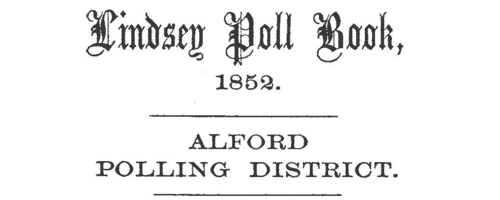
| Missionary gifts
(1855)
The Congregational and a number of other independent churches together formed the Evangelical Alliance, committed to promoting and supporting missions to the heathen. The areas chosen for their projects were Guiana, South Africa, India, the South Seas and China. The work of the missionaries was not only in preaching the Gospel, but also in translating the Bible into local languages, and establishing churches, schools and orphanages. Orphans and native teachers were often given the names of principal contributors or congregations back in Britain. In Britain the large amounts of money needed for this work were raised among the Congregational and independent congregations, arranged by auxiliaries for each county (although some contributions for each county might in fact come in from congregations and individuals in neighbouring areas); money was gathered by ministers, at special services, by supporters, and in missionary boxes. The accounts of all these contributions were published as part of a monthly magazine called the Evangelical Magazine. Each issue of the magazine carried obituaries of prominent members of the congregations; general articles on religion; reviews of newly-published religious books; home news, mainly about meetings of importance or interest by the alliance or in individual churches; and then a separate section called the Missionary Chronicle. The Missionary Chronicle was devoted to letters and reports from the missionaries; and concludes with a set of accounts of donations towards the missionary work. This is the index to the donors of gifts of books, clothing and utensils to be sent to the missions, reported in the magazine, January to December 1855.KEW. Cost: £6.00.  | Sample scan, click to enlarge
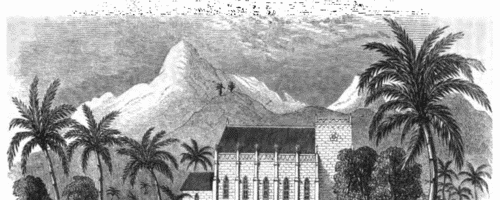
| Gentry in London
(1856)
The Post Office London Directory for 1856 includes this 'Court Directory', listing alphabetically by surname and christian name the upper class residents of the capital with their postal addresses. 'In order to afford space for the addresses, the abbreviation "esq." for esquire has no longer been appended to each name in the Court Directory. It should be understood that such should be added to the name of every gentleman in the following pages to which no inconsistent addition is affixed.' Decorations, honours &c. are generally given. Some gentlemen appear who are also listed (as professional men, &c.) in the commercial section. Those with second residences in the provinces usually have the country address given as well.KEW. Cost: £4.00.  | Sample scan, click to enlarge

| Traders and professionals in London
(1856)
The Post Office London Directory for 1856 includes this 'Commercial and Professional Directory', recording over 100,000 individuals. KEW. Cost: £4.00.  | Sample scan, click to enlarge

|  London Policemen
(1843-1857) London Policemen
(1843-1857)
The Metropolitan Police Register of Joiners (MEPO 4/334) lists policemen joining the force 1 January 1843 to 1 April 1857 (warrant numbers 19893 to 35804). The register is alphabetical, in so far as the recruits are listed chronologically grouped under first letter of surname. It gives Date of Appointment, Name, Number of Warrant, Cause of Removal from Force (resigned, dismissed, promoted or died), and Date of Removal. Although the register was closed for new entrants at the end of 1842, the details of removals were always recorded, some being twenty or more years later. Those recruits not formerly in the police, the army, or some government department, were required to provide (normally) at least two letters of recommendation from persons of standing, and details of these are entered on the facing pages: the names in these are indexed separately - this index refers only to the police constables. Where a recruit was only recently arrived in the metropolis, the names and addresses of the recommenders can be invaluable for tracing where he came from.KEW. Cost: £8.00.  | Sample scan, click to enlarge

|  Sailors and marines awarded the Baltic Medal
(1854-1857) Sailors and marines awarded the Baltic Medal
(1854-1857)
During the Crimean War, a British and French fleet entered the Baltic, and captured Bomarsund harbour and one of the Aland Islands (now part of Finland). Bomarsund is the sound between the islands and the Swedish island of Vardo; and at the fine harbour on Bomarsund, dominating the entrance of the Gulf of Bothnia, and indirectly that of the Gulf of Finland, the Russians had constructed a northern naval base, and this was destroyed in the attack. The British fleet taking part in the Baltic expedition comprised Her Majesty's ships Aeolus, Ajax, Alban, Algiers, Amphion, Archer, Arrogant, Basilisk, Belleisle, Blenheim, Boscawen, Bulldog, Caesar, Calcutta, Centaur, Colossus, Conflict, Cornwallis, Cossack, Cressy, Cruizer, Cuckoo, Cumberland, Dauntless, Desperate, Dragon, Driver, Duke of Wellington, Edinburgh, Esk, Euryalus, Exmouth, Falcon, Firefly, Geyser, Gladiator, Gorgon, Hannibal, Harrier, Hastings, Hawke, Hecla, Hogue, Imperieuse, James Watt, Leopard, Lightning, Locust, Magicienne, Majestic, Merlin, Miranda, Monarch, Neptune, Nile, Odin, Orion, Otter, Pembroke, Penelope, Pigmy, Porcupine, Prince Regent, Princess Royal, Pylades, Resistance, Retribution, Rhadamanthus, Rosamond, Royal George, Royal William, Russell, St George, St Jean D'Acre, St Vincent, Sphinx, Stromboli, Tartar, Termagant, Tribune, Tyne, Valorous, Volage, Volcano, Vulture, Wrangler and Zephyr. This is the medal roll of the naval and marine claimants who qualified for the Baltic Medal for service in 1854 to 1855. The medals were dispatched in batches from early 1857, the first batch being numbered B A 1, the next B A 2, &c.; then follows the destination (a place or, more usually, a ship) and the date of dispatch. Most of the medals had been sent by the end of 1857.KEW. Cost: £8.00.  | Sample scan, click to enlarge

|
| 1 | 2 |  |
Research your ancestry, family history, genealogy and one-name study by direct access to original records and archives indexed by surname.
|













